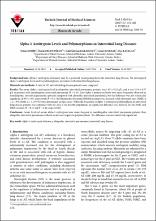Alpha-1 antitrypsin levels and polymorphisms in interstitial lung diseases
Citation
Demir, N., Erçen Diken, Ö., Karabulut, H. G., Karnak, D., Kayacan, O. (2017). Alpha-1 antitrypsin levels and polymorphisms in interstitial lung diseases. Turkish Journal of Medical Sciences, 47(2), 476-482.Abstract
Background/aim: Alpha-1 antitrypsin deficiency may be a potential predisposing factor for interstitial lung fibrosis. We investigated alpha-1 antitrypsin levels and its polymorphisms in patients with interstitial lung disease. Materials and methods: A total of 103 interstitial lung disease patients were compared. Results: The mean alpha-1 antitrypsin level in idiopathic interstitial pneumonia patients was 1.67 ± 0.33 g/L, and it was 1.54 ± 0.37 g/L in patients with nonidiopathic interstitial pneumonia (P = 0.13). Low alpha-1 antitrypsin levels were more frequently observed in nonidiopathic interstitial pneumonia patients compared with idiopathic interstitial pneumonia, but the difference was not statistically significant (8.9% vs. 0%, respectively, P = 0.4). In 100 patients, the normal PiMM genotype was detected, while abnormal ones (PiMZ, n = 2, 1.9%; PiMS, n = 1, 0.97%) were determined in three cases. When the frequency of alpha-1 antitrypsin polymorphism in interstitial lung disease patients was compared with the data of the healthy population, no significant difference was detected for the PiMZ and PiMS variants (P = 0.15 and P = 0.44, respectively). Conclusion: Lower levels of serum alpha-1 antitrypsin were more frequent in nonidiopathic interstitial pneumonia patients than idiopathic interstitial pneumonia without an increase in genetic polymorphism. The difference was not statistically significant. © TÜBİTAK.


















